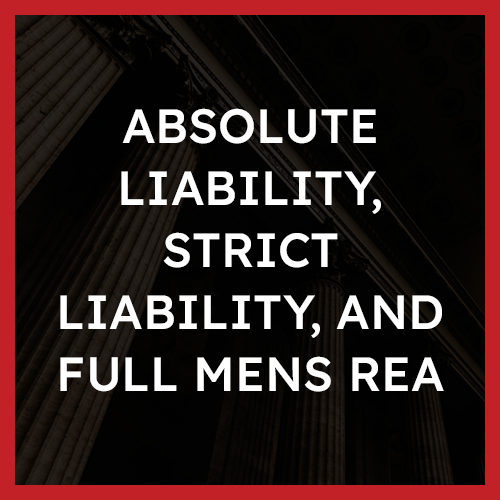What is the Difference Between Absolute Liability, Strict Liability, and Full Mens Rea?

What is Absolute Liability?
Absolute liability is a standard of liability where the prosecution does not need to prove any intent on the part of the accused. As a generalization, they are relatively rare, and are perhaps the least serious of the three mentioned categories. It requires that the prosecution prove only that the unlawful act or omission occurred. There is no opportunity for the defendant to prove that he or she exercised due diligence or that some mistake occurred which lead to the offence. Likewise, there is no requirement to prove that the defendant meant for the act or omission to occur. In other words, the mere act (actus reus) of committing the offence is sufficient to establish guilt. Under absolute liability, the accused may be found guilty even if they were unaware of committing the offence or took all reasonable precautions to prevent it. Absolute liability is often applied to regulatory or public welfare offences, where the focus is on maintaining public safety, protecting the environment, or upholding strict standards. It should be noted, however, that Absolute liability Offences that are punishable by a period of imprisonment violate section 7 of the Charter and are not permissible. Such offences with penal consequences should be treated as strict liability in order to comply with the Charter.
The rationale behind absolute liability is to create a deterrent effect by holding individuals or organizations responsible for certain acts, regardless of their state of mind. Absolute liability eliminates the need to prove a mental state, emphasizing public welfare and deterrence, as this standard places a high burden of responsibility on the accused to ensure compliance with the law.
What is Strict Liability?
Strict liability is a standard of liability that requires the prosecution to prove the actus reus (the guilty act) but not the mens rea (the mental state or intent) of the accused. Unlike absolute liability, strict liability offences typically involve a higher level of potential harm or risk, but they are still considered regulatory offences. Strict liability focuses on objective acts and higher-risk offences, and the accused may be found guilty even if they can demonstrate that they took reasonable precautions or acted in good faith. Upon proof of the act or omission, the burden shifts to the defendant to prove due diligence to avoid a conviction for the offence. An example of strict liability offences may be something to the effect of false or misleading advertising under the Consumer Protection Act. The focus is on the objective act itself, rather than the subjective mental state of the accused. Strict liability serves as a balance between the need for public safety and the recognition of individual efforts to prevent harm.
What is Full Mens Rea?
Full mens rea refers to the mental state or intent required to establish the elements of a particular offence. It is a fundamental principle of criminal law that establishes that an accused person should not be found guilty unless they possess the required mental state, which may vary depending on the offence.
Full mens rea standards include various mental states, such as intent, knowledge, recklessness, and negligence. Mens rea offences are required to be proved by the prosecution either as an inference from the nature of the act committed, or by additional evidence. These mental states/ element of intention, provide the necessary element of fault or culpability, recognizing that a person should only be held accountable for a crime if they had the requisite mental state to commit it.
How do absolute liability, strict liability, and full mens rea apply to regulatory offences?
Regulatory offences are not considered criminal offences. Regulatory offences often relate to conduct which is prohibited because it is beneficial for the public interest. For any regulatory offence, the Crown prosecution does not need to satisfy the mens rea element. All that is necessary for the Crown prosecution to prove is the actus reus of the alleged offence. An example of this would be traffic offences such as failing to stop at a stop sign, or speeding.
Do I need to hire a lawyer to defend me against regulatory offences?
For the vast majority of regulatory offences, the penalties on conviction can range from a mere fine, to a period of imprisonment, and/or probation. The fact that significant fines and periods of imprisonment are available for strict liability and quasi-criminal offences shows how seriously the government views regulatory offences and,as a result, how much is at stake for an individual or organization charged with one. Therefore, it is very important to ensure you have received adequate legal advice and are prepared to respond to such charges accordingly. At Strategic Criminal Defence, we offer a free consultation. Penalties for regulatory offences can include minimum or maximum fines. Some provisions allow for the fines to increase for subsequent breaches or for offenders who have previous convictions.
About The Author







